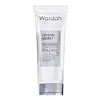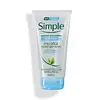Wardah Crystal Secret Foaming Cleanser with Natural AHA+PHA Versus Simple Skincare Water Boost Micellar Cleansing Facial Gel Wash
What's inside
What's inside
 Key Ingredients
Key Ingredients

 Benefits
Benefits

 Concerns
Concerns

 Ingredients Side-by-side
Ingredients Side-by-side

Water
Skin ConditioningAcrylates Copolymer
Sodium Laureth Sulfate
CleansingSodium Lauroyl Sarcosinate
CleansingCocamidopropyl Betaine
CleansingPotassium Cocoyl Glycinate
Lactic Acid
BufferingPanthenol
Skin ConditioningPropylene Glycol
HumectantSodium Chloride
MaskingParfum
MaskingDMDM Hydantoin
PreservativeGuar Hydroxypropyltrimonium Chloride
Skin ConditioningGlycolic Acid
BufferingSalicylic Acid
MaskingDisodium EDTA
Vaccinium Myrtillus Fruit Extract
Skin ConditioningSaccharum Officinarum Extract
MoisturisingCitrus Aurantium Dulcis Fruit Extract
MaskingCitrus Medica Limonum Fruit Extract
Skin ConditioningAcer Saccharum Extract
Skin ConditioningWater, Acrylates Copolymer, Sodium Laureth Sulfate, Sodium Lauroyl Sarcosinate, Cocamidopropyl Betaine, Potassium Cocoyl Glycinate, Lactic Acid, Panthenol, Propylene Glycol, Sodium Chloride, Parfum, DMDM Hydantoin, Guar Hydroxypropyltrimonium Chloride, Glycolic Acid, Salicylic Acid, Disodium EDTA, Vaccinium Myrtillus Fruit Extract, Saccharum Officinarum Extract, Citrus Aurantium Dulcis Fruit Extract, Citrus Medica Limonum Fruit Extract, Acer Saccharum Extract
Water
Skin ConditioningCocamidopropyl Betaine
CleansingPropylene Glycol
HumectantHydroxypropyl Methylcellulose
Emulsion StabilisingSodium Chloride
MaskingPanthenol
Skin ConditioningCitric Acid
BufferingDisodium EDTA
Glycerin
HumectantHydroxypropyl Cyclodextrin
MaskingIodopropynyl Butylcarbamate
PreservativePantolactone
HumectantPhenoxyethanol
PreservativePotassium Chloride
Saccharide Isomerate
HumectantSodium Citrate
BufferingSodium Hydroxide
BufferingTocopheryl Acetate
AntioxidantWater, Cocamidopropyl Betaine, Propylene Glycol, Hydroxypropyl Methylcellulose, Sodium Chloride, Panthenol, Citric Acid, Disodium EDTA, Glycerin, Hydroxypropyl Cyclodextrin, Iodopropynyl Butylcarbamate, Pantolactone, Phenoxyethanol, Potassium Chloride, Saccharide Isomerate, Sodium Citrate, Sodium Hydroxide, Tocopheryl Acetate
 Reviews
Reviews

Ingredients Explained
These ingredients are found in both products.
Ingredients higher up in an ingredient list are typically present in a larger amount.
Cocamidopropyl Betaine is a fatty acid created by mixing similar compounds in coconut oil and dimethylaminopropylamine, a compound with two amino groups.
This ingredient is a surfactant and cleanser. It helps gather the dirt, pollutants, and other impurities in your skin to be washed away. It also helps thicken a product and make the texture more creamy.
Being created from coconut oil means Cocamidopropyl Betaine is hydrating for the skin.
While Cocamidopropyl Betaine was believed to be an allergen, a study from 2012 disproved this. It found two compounds in unpure Cocamidopropyl Betaine to be the irritants: aminoamide and 3-dimethylaminopropylamine. High-grade and pure Cocamidopropyl Betaine did not induce allergic reactions during this study.
Learn more about Cocamidopropyl BetaineDisodium EDTA plays a role in making products more stable by aiding other preservatives.
It is a chelating agent, meaning it neutralizes metal ions that may be found in a product.
Disodium EDTA is a salt of edetic acid and is found to be safe in cosmetic ingredients.
Learn more about Disodium EDTAPanthenol is a common ingredient that helps hydrate and soothe the skin. It is found naturally in our skin and hair.
There are two forms of panthenol: D and L.
D-panthenol is also known as dexpanthenol. Most cosmetics use dexpanthenol or a mixture of D and L-panthenol.
Panthenol is famous due to its ability to go deeper into the skin's layers. Using this ingredient has numerous pros (and no cons):
Like hyaluronic acid, panthenol is a humectant. Humectants are able to bind and hold large amounts of water to keep skin hydrated.
This ingredient works well for wound healing. It works by increasing tissue in the wound and helps close open wounds.
Once oxidized, panthenol converts to pantothenic acid. Panthothenic acid is found in all living cells.
This ingredient is also referred to as pro-vitamin B5.
Learn more about PanthenolPropylene Glycol is an odorless, colorless liquid. As a humectant, it helps skin retain moisture. It also aids in delivering active ingredients.
Another role of this ingredient is preventing a product from melting or freezing. Propylene glycol also adds antimicrobrial properties to a product, elongating product lifespan.
This ingredient is considered an organic alcohol and commonly added into both cosmetics and foods.
Those with sensitive skin or conditions may develop a rash when using this ingredient.
Learn more about Propylene GlycolChances are, you eat sodium chloride every day. Sodium Chloride is also known as table salt.
This ingredient has many purposes in skincare: thickener, emulsifier, and exfoliator.
You'll most likely find this ingredient in cleansers where it is used to create a gel-like texture. As an emulsifier, it also prevents ingredients from separating.
There is much debate on whether this ingredient is comedogenic. The short answer - comedogenic ratings don't tell the whole story. Learn more about comegodenic ratings here.
The concensus about this ingredient causing acne seems to be divided. Research is needed to understand if this ingredient does cause acne.
Scrubs may use salt as the primary exfoliating ingredient.
Learn more about Sodium ChlorideWater. It's the most common cosmetic ingredient of all. You'll usually see it at the top of ingredient lists, meaning that it makes up the largest part of the product.
So why is it so popular? Water most often acts as a solvent - this means that it helps dissolve other ingredients into the formulation.
You'll also recognize water as that liquid we all need to stay alive. If you see this, drink a glass of water. Stay hydrated!
Learn more about Water